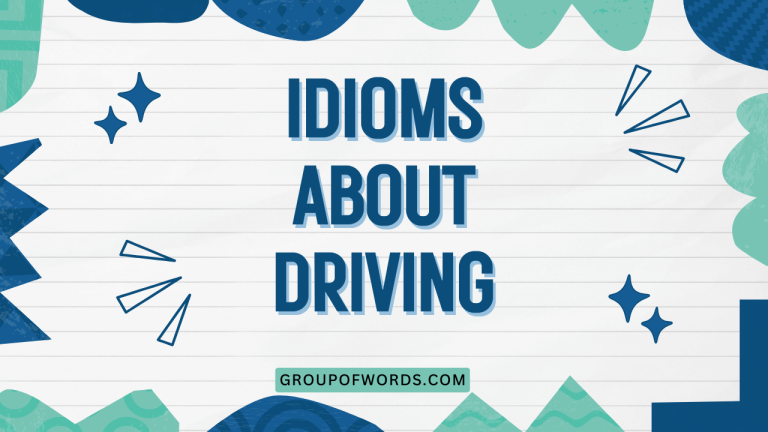Idioms for ‘Stupid’: A Comprehensive Guide
Understanding idioms is crucial for mastering the English language. Idioms add color and depth to conversations, making communication more engaging and nuanced.
This article focuses on idioms that describe stupidity or lack of intelligence. Recognizing and using these idioms correctly can significantly enhance your comprehension and fluency.
This guide is designed for English language learners of all levels, from beginners looking to expand their vocabulary to advanced speakers aiming to refine their expressive abilities.
Table of Contents
- Introduction
- Definition of Idioms for “Stupid”
- Structural Breakdown of Idioms
- Types and Categories of Idioms for “Stupid”
- Examples of Idioms for “Stupid”
- Usage Rules for Idioms for “Stupid”
- Common Mistakes with Idioms for “Stupid”
- Practice Exercises
- Advanced Topics
- Frequently Asked Questions
- Conclusion
Introduction
Idioms are an integral part of the English language, adding color and nuance to everyday conversations. They are expressions whose meanings cannot be understood simply by knowing the meanings of the individual words they contain.
Mastering idioms is essential for achieving fluency and a deeper understanding of English. This article delves into the fascinating world of idioms used to describe a lack of intelligence or stupidity.
By exploring various idioms, their meanings, and usage, you will be better equipped to comprehend and use them effectively in your own communication. This guide aims to enhance your vocabulary, improve your comprehension skills, and make your English sound more natural and expressive.
Definition of Idioms for “Stupid”
An idiom is a phrase or expression whose meaning is different from the literal meaning of its individual words. Idioms often rely on cultural context and figurative language to convey a specific idea or emotion.
Idioms for “stupid” are phrases used to describe someone who lacks intelligence, common sense, or good judgment. These idioms can range from mild and humorous to harsh and insulting, so it’s important to understand their connotations before using them.
The function of these idioms is to provide a more colorful and often more impactful way to express that someone is not very smart.
These idioms are classified as figurative language, specifically under the umbrella of idiomatic expressions. Their function is primarily descriptive, aiming to paint a vivid picture of someone’s lack of intelligence.
The context in which these idioms are used is crucial; some are appropriate in informal settings among friends, while others are best avoided in professional or formal situations.
Structural Breakdown of Idioms
Idioms, by nature, defy simple structural analysis because their meaning is not derived from the sum of their parts. However, we can examine some common patterns in the idioms for “stupid.” Many idioms use metaphors, similes, or personification to convey the idea of lacking intelligence.
For example, “not the sharpest tool in the shed” uses a metaphor to compare a person to a dull tool, implying they are not very intelligent.
Some idioms take the form of a complete sentence, while others are shorter phrases. The grammatical structure can vary widely, including noun phrases, verb phrases, and prepositional phrases.
The key is to recognize that the entire phrase functions as a single unit of meaning, distinct from the literal interpretation of its individual words. Understanding the underlying figurative language and cultural context is more important than analyzing the grammatical structure.
Types and Categories of Idioms for “Stupid”
Idioms for “stupid” can be categorized based on their level of formality and their specific figurative meaning. Here are some common categories:
Humorous Idioms
These idioms are lighthearted and often used in informal settings to playfully tease someone about their lack of intelligence.
Insulting Idioms
These idioms are more direct and can be offensive. They should be used with caution and are generally best avoided in professional or formal settings.
Indirect Idioms
These idioms use more subtle or roundabout ways to imply that someone is not very intelligent. They can be used to soften the blow or to avoid being too direct.
Figurative Idioms
These idioms rely heavily on figurative language, such as metaphors and similes, to convey the idea of stupidity.
Examples of Idioms for “Stupid”
Below are several tables filled with idioms that convey a lack of intelligence, categorized for clarity and ease of understanding. Each table provides the idiom, its meaning, and example sentences.
Table 1: Humorous Idioms for “Stupid”
This table presents idioms that are lighthearted and often used in informal settings to playfully tease someone about their lack of intelligence.
| Idiom | Meaning | Example Sentence |
|---|---|---|
| Not the sharpest tool in the shed | Not very intelligent | He’s a nice guy, but he’s not the sharpest tool in the shed. |
| Not the brightest bulb in the box | Not very intelligent | She’s a hard worker, but she’s not the brightest bulb in the box. |
| A few sandwiches short of a picnic | Lacking common sense or intelligence | I think he’s a few sandwiches short of a picnic; he keeps making silly mistakes. |
| One brick short of a load | Not very intelligent | He’s one brick short of a load if he thinks that plan will work. |
| Not playing with a full deck | Not very intelligent or sane | She’s not playing with a full deck; she believes in conspiracy theories. |
| A couple fries short of a Happy Meal | Not very intelligent | Sorry, but he’s a couple fries short of a Happy Meal. |
| Elevator doesn’t go all the way to the top floor | Not very intelligent | His elevator doesn’t go all the way to the top floor if he thinks he can get away with that. |
| Lost his marbles | Lost his mind or intelligence | I think he’s lost his marbles if he thinks that’s a good idea. |
| Not the quickest study | Slow to learn or understand | He’s not the quickest study, but he’s persistent. |
| As thick as a brick | Very stupid | He is as thick as a brick; he doesn’t understand anything I say. |
| Doesn’t know beans | Knows nothing | He doesn’t know beans about computers. |
| Not wrapped too tight | Slightly crazy or not very intelligent | I think he’s not wrapped too tight; he laughs at inappropriate times. |
| Out to lunch | Absent-minded or not paying attention | He’s always out to lunch during meetings. |
| Not all there | Mentally absent or not very intelligent | I don’t think he’s all there; he seems confused all the time. |
| A few cards short of a full deck | Not very intelligent | He’s a few cards short of a full deck if he thinks he can fool me. |
| Not the sharpest crayon in the box | Not very intelligent | She’s not the sharpest crayon in the box, but she’s very creative. |
| Not the brightest spark | Not very intelligent | He’s not the brightest spark, but he’s a good friend. |
| Has bats in the belfry | Crazy or eccentric | I think she has bats in the belfry; she talks to herself. |
| A screw loose | Slightly crazy or not very intelligent | I think he has a screw loose; he’s always doing strange things. |
| Not the shiniest penny in the lot | Not very intelligent | He’s not the shiniest penny in the lot, but he has a heart of gold. |
| One bubble off plumb | Not very intelligent | He’s one bubble off plumb if he believes that story. |
| Has rocks in his head | Stupid or foolish | He has rocks in his head if he thinks he can get away with that. |
| A sandwich short of a picnic | Not very smart | He’s a sandwich short of a picnic, but he’s a good worker. |
| As dumb as a doornail | Extremely stupid | He’s as dumb as a doornail; he can’t even tie his shoes. |
Table 2: Insulting Idioms for “Stupid”
This table presents idioms that are more direct and can be offensive. They should be used with caution and are generally best avoided in professional or formal settings.
| Idiom | Meaning | Example Sentence |
|---|---|---|
| As dumb as a post | Extremely stupid | He’s as dumb as a post; I can’t believe he got the job. |
| Brain dead | Extremely stupid | That was a brain dead idea. |
| Idiot | A very stupid person | He’s such an idiot for believing that lie. |
| Moron | A very stupid person | Only a moron would do something like that. |
| Imbecile | A very stupid person | He’s acting like an imbecile. |
| Dense | Slow to understand; stupid | He’s so dense; I have to explain everything to him multiple times. |
| Thick-headed | Stupid; stubborn | He’s too thick-headed to understand my point. |
| Nitwit | A stupid or foolish person | Don’t be such a nitwit! |
| Blockhead | A stupid person | He’s a real blockhead. |
| Bonehead | A stupid person | He’s such a bonehead for making that mistake. |
| Dunce | A stupid person who is slow at learning | He’s a dunce; he can’t seem to grasp the basics. |
| Fool | A stupid or silly person | Don’t be a fool! |
| Simpleton | A person considered foolish or unintelligent | He’s a simpleton. |
| Dimwit | A stupid person | He’s such a dimwit. |
| Half-wit | A stupid person | He’s a half-wit. |
| Numbskull | A stupid person | He’s a numbskull. |
| Airhead | A stupid or frivolous person | She’s such an airhead. |
| Dolt | A stupid person | He’s a dolt. |
| Ignoramus | An ignorant or stupid person | He’s an ignoramus when it comes to science. |
| Nincompoop | A foolish or stupid person | He’s such a nincompoop. |
| Ninny | A foolish person | Don’t be a ninny! |
| Goofball | A silly or foolish person | He’s such a goofball. |
| Doofus | A stupid or inept person | He’s such a doofus. |
| Lamebrain | A stupid person | He’s a lamebrain. |
| Birdbrain | A stupid person | She’s a birdbrain. |
Table 3: Indirect Idioms for “Stupid”
This table presents idioms that use more subtle or roundabout ways to imply that someone is not very intelligent. They can be used to soften the blow or to avoid being too direct.
| Idiom | Meaning | Example Sentence |
|---|---|---|
| Not the smartest cookie in the jar | Not very intelligent | He’s not the smartest cookie in the jar, but he’s a good friend. |
| Not firing on all cylinders | Not functioning at full capacity; not very intelligent | He’s not firing on all cylinders today; he seems confused. |
| A bit slow | Not quick to understand; somewhat stupid | He’s a bit slow, so you have to explain things carefully. |
| A few bricks shy of a load | Not very intelligent | He’s a few bricks shy of a load if he thinks that will work. |
| Hasn’t got both oars in the water | Not very intelligent or competent | I don’t think he’s got both oars in the water; he’s making strange decisions. |
| Not the quickest on the uptake | Slow to understand | He’s not the quickest on the uptake, so be patient with him. |
| Not the sharpest knife in the drawer | Not very intelligent | He’s not the sharpest knife in the drawer, but he’s reliable. |
| Bless his/her heart | Said with condescension about someone perceived as foolish | Bless his heart, he tried his best, even though he didn’t understand. |
| Not the brightest star in the sky | Not very intelligent | She’s not the brightest star in the sky, but she’s kind. |
| A crayon short of a full box | Not very intelligent | He’s a crayon short of a full box if he believes that story. |
| Not the sharpest marble in the bag | Not very intelligent | He’s not the sharpest marble in the bag, but he’s a good worker. |
| A wheel short of a bicycle | Not very intelligent | He’s a wheel short of a bicycle, but he means well. |
| Not operating at full capacity | Not functioning at full mental ability | He’s not operating at full capacity today. |
| A few buttons missing from his remote control | Not very intelligent or sane | He’s a few buttons missing from his remote control. |
| Not the smartest bulb in the lamp | Not very intelligent | He’s not the smartest bulb in the lamp, but he’s eager to learn. |
| A few pennies short of a dollar | Not very intelligent | He’s a few pennies short of a dollar, but he’s a good person. |
| Not exactly a rocket scientist | Not very intelligent | She’s not exactly a rocket scientist, but she’s very practical. |
| A sandwich short of a full course meal | Not very intelligent | He’s a sandwich short of a full course meal, but he’s a hard worker. |
| Not the brightest light on the Christmas tree | Not very intelligent | He’s not the brightest light on the Christmas tree, but he’s cheerful. |
| A few tacos short of a combination plate | Not very intelligent | He’s a few tacos short of a combination plate, but he’s fun to be around. |
| Not the sharpest tack in the box | Not very intelligent | He’s not the sharpest tack in the box, but he’s loyal. |
| A few clowns short of a circus | Not very intelligent | He’s a few clowns short of a circus, but he’s entertaining. |
| Not the sharpest spoon in the drawer | Not very intelligent | He’s not the sharpest spoon in the drawer, but he’s helpful. |
| A few apples short of a pie | Not very intelligent | He’s a few apples short of a pie, but he’s got a good heart. |
| Not the sharpest knife in the cutlery set | Not very intelligent | He’s not the sharpest knife in the cutlery set, but he’s reliable. |
Table 4: Figurative Idioms for “Stupid”
These idioms rely heavily on figurative language, such as metaphors and similes, to convey the idea of stupidity.
| Idiom | Meaning | Example Sentence |
|---|---|---|
| As silly as a goose | Very silly or foolish | She’s as silly as a goose when she’s excited. |
| Like talking to a brick wall | Trying to communicate with someone who doesn’t understand or listen | It’s like talking to a brick wall when I try to explain it to him. |
| As daft as a brush | Very silly or foolish | He’s as daft as a brush. |
| As nutty as a fruitcake | Crazy or eccentric | She’s as nutty as a fruitcake. |
| Head in the clouds | Daydreaming; not paying attention to reality | He always has his head in the clouds. |
| Living in a fool’s paradise | Believing in a false or unrealistic sense of happiness or security | He’s living in a fool’s paradise if he thinks he can get away with that. |
| Barking mad | Completely insane | She’s barking mad. |
| Off his rocker | Crazy or eccentric | He’s off his rocker. |
| Round the bend | Crazy or eccentric | She’s gone round the bend. |
| Bonkers | Crazy or eccentric | He’s completely bonkers. |
| Out of his mind | Crazy or eccentric | She’s out of her mind. |
| Mad as a hatter | Completely insane | He’s as mad as a hatter. |
| Nutty as a squirrel | Crazy or eccentric | She’s as nutty as a squirrel. |
| Loony tunes | Crazy or eccentric | He’s got loony tunes. |
| Batty | Crazy or eccentric | She’s a bit batty. |
| Crackers | Crazy or eccentric | He’s completely crackers. |
| Soft in the head | Stupid or foolish | She’s a bit soft in the head. |
| Not all there in the head | Stupid or foolish | He’s not all there in the head. |
| Has a screw loose in the head | Crazy or eccentric | She’s got a screw loose in the head. |
| Light in the loafers | Stupid or foolish | He’s a bit light in the loafers. |
| As thick as two short planks | Very stupid | He’s as thick as two short planks. |
| As dense as lead | Very stupid | He’s as dense as lead. |
| As bright as a black hole | Not intelligent at all | He’s as bright as a black hole. |
| Running on empty | Operating without much intelligence or energy | He’s running on empty today. |
| Lost in space | Confused and disoriented | He’s lost in space. |
Usage Rules for Idioms for “Stupid”
Using idioms correctly requires understanding their specific meanings and the contexts in which they are appropriate. Here are some key rules to follow:
- Context is key: Consider the formality of the situation and your relationship with the person you are speaking to. Avoid using insulting idioms in professional or formal settings.
- Know the connotation: Be aware of the emotional tone of the idiom. Some idioms are humorous, while others are offensive.
- Use sparingly: Overusing idioms can make your speech sound unnatural. Use them selectively to add emphasis and color to your communication.
- Understand the cultural reference: Some idioms are specific to certain cultures or regions. Make sure you understand the cultural context before using them.
- Pay attention to verb tense: Adjust the verb tense of the idiom to match the time frame you are discussing. For example, “He was not the sharpest tool in the shed” (past tense).
Common Mistakes with Idioms for “Stupid”
One common mistake is misunderstanding the meaning of an idiom and using it incorrectly. For example, someone might think “not the sharpest tool in the shed” means someone is physically weak, rather than lacking intelligence.
Another mistake is using an idiom in an inappropriate context. For example, using “as dumb as a post” in a formal business presentation would be highly inappropriate.
A further common error is attempting to alter an idiom. Idioms are fixed expressions, and changing the words can alter or destroy their meaning.
For example, saying “not the sharpest knife in the drawer” instead of “not the sharpest tool in the shed” might confuse the listener.
Here are some examples of common mistakes and their corrections:
| Incorrect | Correct | Explanation |
|---|---|---|
| He is not the sharpest knife in the drawer. | He is not the sharpest tool in the shed. | “Tool in the shed” is the correct idiom. |
| She is as stupid as a door. | She is as dumb as a post. | “Dumb as a post” is the common idiom. |
| He has a couple fries missing from a Happy Meal. | He has a couple fries short of a Happy Meal. | “Short of” is the correct preposition. |
Practice Exercises
Test your understanding of idioms for “stupid” with these exercises. Choose the correct idiom to complete each sentence.
Exercise 1: Multiple Choice
Choose the best idiom to complete each sentence.
| Question | Options | Answer |
|---|---|---|
| He’s a nice guy, but he’s __________. | a) the sharpest tool in the shed, b) not the sharpest tool in the shed, c) a sharp tool in the shed | b) not the sharpest tool in the shed |
| She’s __________, so you have to explain things slowly. | a) a bit fast, b) a bit slow, c) very quick | b) a bit slow |
| I think he’s __________, he’s always making mistakes. | a) playing with a full deck, b) not playing with a full deck, c) decking cards | b) not playing with a full deck |
| He’s __________, he can’t understand simple instructions. | a) as bright as the sun, b) as dumb as a post, c) as smart as a fox | b) as dumb as a post |
| She’s __________, she’s always daydreaming. | a) head in the clouds, b) feet on the ground, c) head in a book | a) head in the clouds |
| He’s __________, he keeps making silly decisions. | a) a genius, b) a nincompoop, c) very clever | b) a nincompoop |
| She’s __________, but she’s very kind. | a) the brightest star in the sky, b) not the brightest star in the sky, c) a shining star | b) not the brightest star in the sky |
| He’s __________, if he thinks he can get away with that. | a) a few bricks shy of a load, b) carrying a full load, c) building a wall | a) a few bricks shy of a load |
| She’s __________, she believes in conspiracy theories. | a) off her rocker, b) very stable, c) completely sane | a) off her rocker |
| He’s __________, he doesn’t understand anything. | a) as thick as a brick, b) very thin, c) as clear as glass | a) as thick as a brick |
Exercise 2: Fill in the Blanks
Fill in the blanks with the correct idiom from the list below.
Idiom List: Not the sharpest tool in the shed, A few sandwiches short of a picnic, As dumb as a post, Head in the clouds, Not playing with a full deck, Brain dead, A bit slow, Off his rocker, Like talking to a brick wall, As thick as a brick
| Question | Answer |
|---|---|
| He’s __________, I can’t believe he got the job. | As dumb as a post |
| She’s __________, so you have to explain things carefully. | A bit slow |
| I think he’s __________, he keeps making silly mistakes. | A few sandwiches short of a picnic |
| It’s __________ when I try to explain it to him. | Like talking to a brick wall |
| That was a __________ idea. | Brain dead |
| He’s __________, he can’t understand simple instructions. | As thick as a brick |
| She’s __________, she’s always daydreaming. | Head in the clouds |
| He’s a nice guy, but he’s __________. | Not the sharpest tool in the shed |
| I think she’s __________. | Off his rocker |
| I think he is __________, he believes in conspiracy theories. | Not playing with a full deck |
Advanced Topics
For advanced learners, exploring the etymology and cultural origins of these idioms can provide a deeper understanding of their meaning and usage. For example, the idiom “mad as a hatter” is believed to originate from the historical practice of using mercury in the hat-making process, which caused neurological damage and erratic behavior in hatters.
Another advanced topic is understanding the subtle differences in meaning between similar idioms. For example, “not the sharpest tool in the shed” is generally considered more humorous and less offensive than “as dumb as a post.”
Analyzing how these idioms are used in literature and media can also enhance your understanding of their nuances and cultural significance. Pay attention to the context in which they are used and the effect they have on the audience.
Frequently Asked Questions
Here are some frequently asked questions about idioms for “stupid”:
- What is an idiom?
An idiom is a phrase or expression whose meaning cannot be understood from the literal meanings of its individual words. It’s a figurative expression that has a specific meaning known to native speakers of the language.
- Why is it important to learn idioms?
Learning idioms is essential for understanding and communicating effectively in English. Idioms are commonly used in everyday conversation, literature, and media. Understanding idioms will help you comprehend the nuances of the language and sound more natural when you speak.
- How can I learn idioms effectively?
The best way to learn idioms is to encounter them in context, such as through reading, listening to conversations, and watching movies or TV shows. Keep a notebook of new idioms you encounter and look up their meanings. Practice using them in your own speech and writing.
- Are idioms the same in all cultures?
No, idioms are often specific to a particular culture or language. What might be a common idiom in English could be meaningless or even offensive in another culture. It’s important to be aware of cultural differences when using idioms.
- Is it okay to use insulting idioms?
It’s generally best to avoid using insulting idioms, especially in professional or formal settings. Using such idioms can be offensive and damage your reputation. Choose your words carefully and consider the impact they might have on others.
- How can I tell if a phrase is an idiom?
If the meaning of a phrase doesn’t make sense when you interpret it literally, it’s likely an idiom. Also, idioms are often fixed expressions, meaning you can’t change the words without altering the meaning.
- What is the difference between an idiom and a metaphor?
A metaphor is a figure of speech that directly compares two unrelated things, suggesting a likeness between them (“He is a lion”). An idiom is a phrase whose overall meaning is different from the literal meanings of its individual words (“It’s raining cats and dogs”). While some idioms may contain metaphors, not all metaphors are idioms.
- Are there any resources that can help me learn more idioms?
Yes, there are many resources available, including online dictionaries, idiom books, and language learning websites. Look for resources that provide definitions, examples, and practice exercises.
- How can I incorporate idioms into my writing?
When incorporating idioms into your writing, consider your audience and the tone of your writing. Use idioms sparingly and make sure they fit the context. Overusing idioms can make your writing sound unnatural.
- Why do idioms sometimes seem illogical?
Idioms often seem illogical because their meanings are rooted in historical or cultural contexts that are not immediately obvious. Over time, the original meanings may have been lost or altered, leaving us with expressions that seem strange or nonsensical on the surface.
Conclusion
Mastering idioms for “stupid” can significantly enhance your understanding and use of the English language. By recognizing and using these idioms appropriately, you can add color, depth, and nuance to your communication.
Remember to consider the context, connotation, and cultural relevance of each idiom before using it. Practice regularly, and don’t be afraid to make mistakes – they are a natural part of the learning process.
With dedication and perseverance, you can confidently incorporate these idioms into your vocabulary and communicate more effectively in English. Continue to explore and expand your knowledge of idioms, and you’ll find your language
skills becoming more refined and your conversations more engaging.
Embrace the challenge and enjoy the journey of mastering these colorful expressions!






